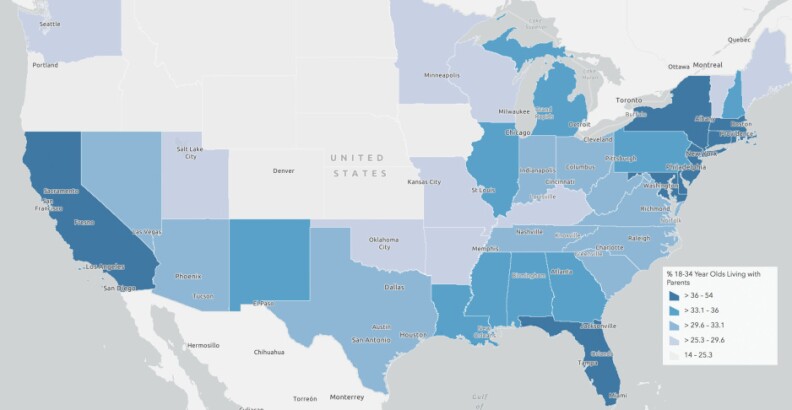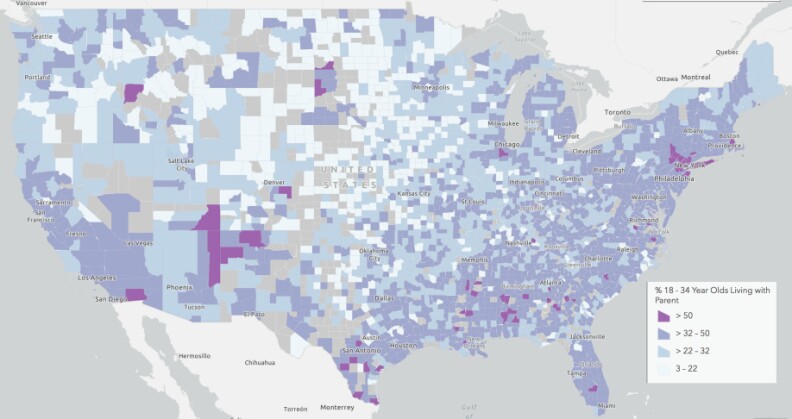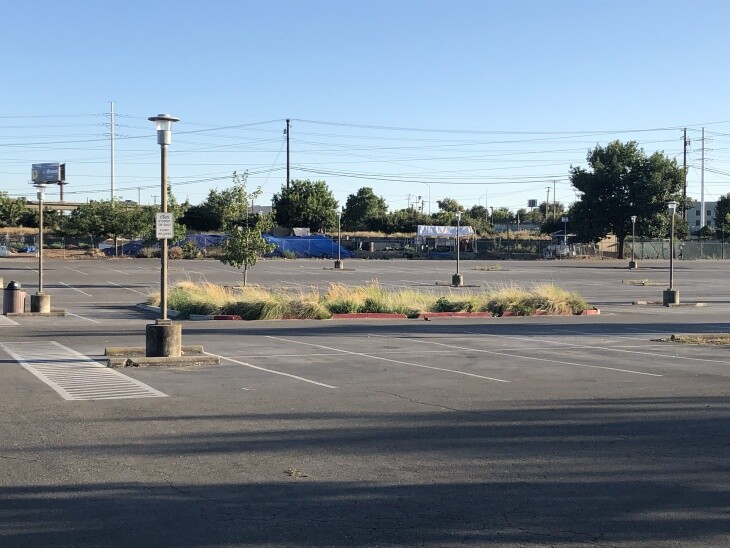Sex, Alcohol And... Parents? The Realities Of Living At Home

It's a Saturday night at Patsy's Irish Pub in Mission Viejo, a wealthy suburb in south Orange County.
Patsy's looks like a lot of other California bars in 2019 -- a young woman belting off-key Katy Perry karaoke, a crowd of patrons vaping outside in a strip mall parking lot.
And loads of 20- and 30-year-olds who still live with their parents.
"I'm here right now getting drunk with my mom," said Jacob Ostheimer, a 24-year old who lives with his mother and step-father ... and his wife. "The whole family's here."
Ostheimer, who said he was co-founding a cannabis company with his stepfather, is not alone. Statewide, roughly 37% of Californians age 18 to 34 live with their parents, according to U.S.Census Bureau data.
In this pricey part of Southern California, where the average home is valued at well over $700,000, about 55% of young adults shack up with mom and/or dad.
"[My wife and I] had an apartment here for two years," said Ostheimer. "But I was spending like 30 grand a year in rent, and I could have had that in my savings right now."
Despite a booming economy and sizzling job market, millennial, and now Generation Z, Californians are as likely to live at home as young Californians were a decade ago during the depths of the Great Recession.
"This has, I think, surprised many of us, including myself," said Richard Fry, a senior researcher with the Pew Research Center, who says he expected multi-generational living arrangements to decline as the economy recovered.
"Clearly in certain areas rents have gone up and the cost of living independently has increased."
Here's everything you need to know about the roughly 3.6 million Californians living with mom and dad into their 20's and early 30's. Yes, including the sex stuff.
THE GEOGRAPHY OF LIVING WITH YOUR PARENTS
California is not the only state with a high rate of young adults living with mom and dad. The living arrangement is equally common in high-cost states such as New York and Massachusetts. In New Jersey, an astonishing 46% of 18- to 34-year olds stay with at least one of their parents, according to Census Bureau data.


Looking at where in California young adults are living with their parents explains a lot about the reasons why. Somewhat counterintuitively, expensive urban cores in places such as San Diego and San Francisco actually have relatively low rates of young adults living at home, owing to the large numbers of twenty-somethings who shack up with roommates to defray housing costs.

Hotspots where stay-at-homers are most ubiquitous usually come in one of two flavors: affluent suburbs near the coast, or lower-income areas often farther inland and with a high concentration of Latino households.
Places like Mission Viejo, with a median household income of over $100,000, are a good example of that first flavor. So are expensive Southern California communities like Palos Verdes or Bay Area burbs like Cupertino and Saratoga, where more than half of young adults live at home.
On the other end of the income spectrum are places like Imperial County, in the southeast tip of the state, or portions of Fresno and Merced counties in the Central Valley. Housing prices are relatively low, but poverty rates are high. Here, young adults are often providing essential financial support to their families.
"The degree of help that young people are giving their parents, particularly among Hispanics, is important to keep in mind," said Jessica Hardie, professor of sociology at Hunter College, CUNY, who studies transitions to adulthood. "I think it's important to think about how it's benefitting the parents, not just the young adults."
WHO ARE THESE YOUNG PEOPLE, EXACTLY?
Not all of them are so young. About 1 of every 4 Californians between 25 and 34 live with their parents -- around 1.5 million people, according to a CalMatters analysis of Census Bureau data.
Stay-at-homers are more likely to be male than female, are more likely to be a person of color than white, and are more likely to live in an immigrant household than their counterparts who have flown the coop.
Beyond the financial benefits of living at home, cultural differences in the stigmas attached to staying with parents -- and feelings of obligation to family -- also contribute to the trend. Nearly half of California Latinos between 18 and 34 live at home.
"[Hispanics] tend to have higher levels of what we call familism -- high regard for family, obligations to family, closeness to family members," said Hardie, who researches young adult living arrangements.
Stereotypes of unemployed, shiftless man-children playing X-Box in their parents' basement aren't really borne out by the data. More than 40% of California stay-at-homers are enrolled in school of some sort, often community college. The vast majority who are not in school are working at least part time.
Perhaps unsurprisingly, those who are working typically aren't making much money. The median income for a working stay-at-homer over the age of 25 is just north of $22,000.
LOVE AND SEX, WITH MOM AND DAD DOWN THE HALL
Where do young Californians living at home get intimate with their partners? Some are resorting to a tried and true form of privacy.
A Hyundai. Sedan.
"[The car] is small. Very small. Compact, really," laughed Vicki, a 22-year-old college student who lives with her parents in the suburbs of Sacramento.
Vicki and her boyfriend Logan, 25, have fond memories of a parking lot across from the football field at Sacramento State University. Vicki and Logan are pseudonyms -- they requested their real names not be used for this story.

Logan also lives with his parents, which made finding a place to have sex somewhat problematic, at least early in the relationship. Vicki's parents forbid Logan from spending the night.
So on weekdays after class, Vicki would tell her parents she would be studying late -- like 3 a.m. late.
"At times it would have been more comfortable or more convenient if we could go to like an apartment or a room in general," said Vicki. "But for a while it was fun."
Three months into the relationship, Vicki and Logan now typically get intimate in Logan's bedroom at his parents' place. Logan says his parents generally don't care, or at least haven't told him if they do. He chips in on the mortgage anyway.
"This is a new world for both parents and children," said Dr. Helen Fisher, a researcher on sex and love at the Kinsey Institute. "In my day, one never took a boy home. Never."
Fisher said parents are generally less concerned about their adult children having sex in their house than they are about their children saving up enough money to buy a house of their own one day.
And a certain type of parent might actually prefer to keep their children and their partners this close.
"Some people might be pleased with it because they get to know their child in a new way, and they get to know some of the people they are going around with," said Fisher. "They're helicopter parents."
But even while parents are more sexually permissive than they used to be, it doesn't mean it's a boon to your average young person's sex life.
"It's impacting their love life in an important way -- they're having less sex," said Fisher.
Lots of ink has been spilled in recent years on the so-called "sex recession" -- why younger people are having less sex than they used to. Researchers have hypothesized explanations ranging from the prevalence of online pornography to hook-up culture and dating apps.
And while some couples like Vicki and Logan have resorted to a vehicular bedroom, their parking spot is actually the exception, not the rule. Public sex is likely down among younger adults, said Fisher.
CHICKEN-AND-EGG MARRIAGE QUESTIONS
Lame dad jokes aside, people in long-term relationships or marriages are much more likely to be having sex than singles.
Which raises a head-scratching question for those who study multi-generational households: Are young people living with their parents longer because they're not in long-term relationships, or are they not in relationships because it's tough to attract a partner when you're living at home?
"I don't know which is the chicken and which is the egg," said Richard Fry, the Pew researcher. "The evidence is pretty clear that young adults who live with a partner or spouse don't usually live with mom or dad. But over the last 60 years, young adults are substantially less likely to be partnered or to be married."
California's high cost of living is complicating that reasoning. In south Orange County, where living with your parents well into young adulthood is relatively free of stigma, moving out is no guarantee your love life will improve.
Ian Baker is 29 and works two low-wage jobs, one at a bowling alley near Mission Viejo. He moved out of his mother's place a little less than a year ago, and hasn't been on a date since.
"Living with my parents it actually wasn't that hard to try and meet girls. Honestly, it became harder when I moved out, just because of the fact that in order to move out I had to start working two jobs," said Baker.
Baker now pays $700 a month in rent to split a two-bedroom apartment with three roommates.
The irony isn't lost on him. But Baker takes solace in the fact that he enjoys a romantic step-up from at least one of his roommates. The one who lives in the living room.
"At least I have a door, he doesn't," said Baker. "So I think it's a little bit harder for him."
The California Dream series is a statewide media collaboration of CALmatters, KPBS, KPCC, KQED and Capital Public Radio with support from the Corporation for Public Broadcasting and the James Irvine Foundation.
-
The severe lack of family friendly housing has millennial parents asking: Is leaving Southern California our only option?
-
As the March 5 primary draws closer, many of us have yet to vote and are looking for some help. We hope you start with our Voter Game Plan. Since we don't do recommendations, we've also put together a list of other popular voting guides.
-
The state's parks department is working with stakeholders, including the military, to rebuild the San Onofre road, but no timeline has been given.
-
Built in 1951, the glass-walled chapel is one of L.A.’s few national historic landmarks. This isn’t the first time it has been damaged by landslides.
-
The city passed a law against harassing renters in 2021. But tenant advocates say enforcement has been lacking.
-
After the luxury towers' developer did not respond to a request from the city to step in, the money will go to fence off the towers, provide security and remove graffiti on the towers.






